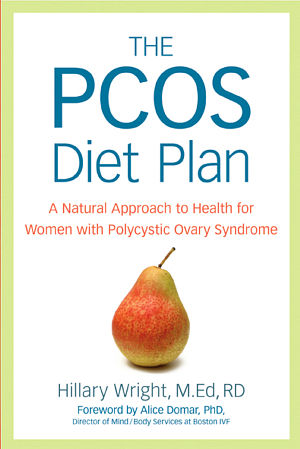Book Review: The PCOS Diet Plan by Hillary Wright, MEd, RD
This is one in a series of book reviews. You may find these books beneficial if you: manage prediabetes or diabetes, follow a diabetes meal plan and/or try to eat healthy to live well. These book reviews also appear on amazon.com. The books can be found in my amazon a-store. Please check them out and consider a purchase.
- Have you been diagnosed with PCOS and are looking for help?
- Are you trying to solve the mystery of your infertility?
- Are you trying to put the following signs and symptoms together to diagnose your medical problem: irregular or no periods, hair growth in unwanted places, weight gain, above normal blood glucose levels?
- Have you ever heard of PCOS?
 Polycystic Ovary Syndrome – PCOS for short, may finally help you put the puzzle of your medical symptoms together. According to Hillary Wright, MEd, RD, author of The PCOS Diet Plan: A Natural Approach to Health for Women with Polycycstic Ovary Syndrome, PCOS is the most common female hormonal disorder. It affects 5 to 10% of women and more than this number of women may experience several but not all of the symptoms.Wright says, “PCOS is a complex genetic disorder. It’s incurable, but controllable.” Sadly PCOS often goes undiagnosed for years until women face infertility issues or worse yet, it’s never diagnosed.
Polycystic Ovary Syndrome – PCOS for short, may finally help you put the puzzle of your medical symptoms together. According to Hillary Wright, MEd, RD, author of The PCOS Diet Plan: A Natural Approach to Health for Women with Polycycstic Ovary Syndrome, PCOS is the most common female hormonal disorder. It affects 5 to 10% of women and more than this number of women may experience several but not all of the symptoms.Wright says, “PCOS is a complex genetic disorder. It’s incurable, but controllable.” Sadly PCOS often goes undiagnosed for years until women face infertility issues or worse yet, it’s never diagnosed.
Good news is that there’s greater awareness of PCOS today, more cases diagnosed and better treatments. I’m particularly interested in PCOS and this complete guide from my colleague Hillary Wright because of the strong connections between PCOS and prediabetes and eventually type 2 diabetes. Let’s just say research suggests that women who have PCOS are at much greater risk for developing metabolic syndrome, a precursor if you don’t take action, to prediabetes.
What’s at the core of PCOS? Wright notes, “the driving force toward PCOS is insulin resistance.” The same can be said for the continuum of metabolic syndrome, to prediabetes and to type 2. Fifty to 80% of women with PCOS are overweight. (The same can be said for prediabetes.) And 50% of women with PCOS meet the criteria for metabolic syndrome. Why some women develop PCOS along with insulin resistance remains a question.
Wright’s book is divided into four parts and is about 250 pages in length. Wright dedicates part 1 to giving the reader an indepth overview of PCOS. In part 2, the largest section of the book and appropriately so, Wright takes a step-by-step approach to layout the hows and whys for her food and eating plan recommendations. As Wright states, “It’s about modifying your behavior to incorporate lifelong healthy habits (that would be for the rest of one’s life).” This is not ‘a diet’. Wright doesn’t profess the need for an extreme makeover. She explains that insulin resistance, (remember, that’s what you’re treating), responds to a small amount of weight loss derived from healthy eating and some physical activity. Hmm sounds familiar? (Yes, it’s the same treatment for prediabetes.) The goal? Increase insulin sensitivity which “fixes” some of the symptoms and medical problems, such as elevated blood glucose and abnormal lipids.
Wright notes, “women with PCOS are a high risk for jumping on the low carbohydrate bandwagon.” The problemwith this approach. Wright says, is that it ignores research supporting the value of foods with good quality carbohydrate – whole grains, fruits, vegetables and low fat dairy foods. (Thanks for the sanity, Hillary!) Wright takes a very holistic and natural approach to the treatment of PCOS. She is practical and realistic in her approach, particularly in part 3 The PCOS Diet: Making It Happen. Part 4 covers other considerations such as planning for pregnancy (yes, with treatment many women find they are finally able to conceive), finding support and more.
research supporting the value of foods with good quality carbohydrate – whole grains, fruits, vegetables and low fat dairy foods. (Thanks for the sanity, Hillary!) Wright takes a very holistic and natural approach to the treatment of PCOS. She is practical and realistic in her approach, particularly in part 3 The PCOS Diet: Making It Happen. Part 4 covers other considerations such as planning for pregnancy (yes, with treatment many women find they are finally able to conceive), finding support and more.
All in all Wright has put together a very complete guide. It’s way more than just a “Diet Plan.” She integrates a science-based approach and matches that with her practical approach gained from years of counseling women with PCOS in the Boston area. My one critique of the book: there’s more basic medical and nutrition information than need be.
I know for Hillary this book has been a multi-year labor of love coming from a desire to share her acquired learnings of working with women with PCOS with a wider audience around the world. Congratulations Hillary and thanks for pursuing your dream! I’m hopeful that women who’ve been diagnosed with PCOS or suspect they have it will flock to your book for assistance. And hopefully many among this flock will catch PCOS early enough to take the actions necessary to also slow or prevent the progression to prediabetes or type 2.

